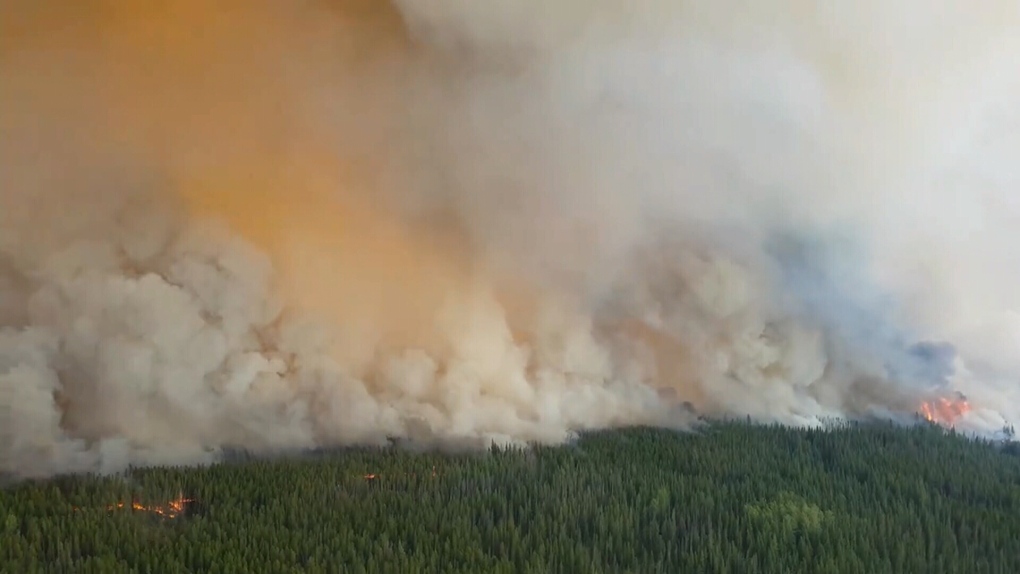Cariboo district issues three wildfire evacuation alerts near 100 Mile House
 This is the Bishops Bluff wildfire pictured on Aug. 13, 2017. This fire has since merged with several others in the western Cariboo to create the massive Plateau fire. (BC Wildfire Service)
This is the Bishops Bluff wildfire pictured on Aug. 13, 2017. This fire has since merged with several others in the western Cariboo to create the massive Plateau fire. (BC Wildfire Service)
The Cariboo Regional District issued three evacuation alerts due to wildfires near 100 Mile House Saturday afternoon.
The alerts cover new areas around Canim Lake and four properties near Little Drewry Lake, and come amid a difficult summer for B.C. wildfire crews.
“Because of the potential danger to life and health, the Cariboo Regional District has issued an Evacuation Alert,” read the alerts.
Canim Lake “Area #3” includes 243 parcels of land which cover 20,641 hectares. Canim Lake “Area #4” includes 153 land parcels, covering 32,049 hectares. Areas 1 and 2 have been on evacuation alerts since early July.
The Little Drewry Lake alert includes four properties and covers 1,839 hectares.
Although residents were not being asked to evacuate, the alert means they need to be ready to leave on a moment’s notice should conditions become more dangerous.
According to data from the BC Wildfire Service, a fire south of Canim Lake has been burning since June 30, and another fire, northeast of the evacuation areas, has been burning since July 1. Both were caused by lighting and while the former is categorized as a “wildfire of note,” the latter is being described as “out of control.”
The alerts come as 277 wildfires are burning in B.C., 78 of which have started in the past two days. Experts have linked the severity of the province’s wildfires to climate change, noting that less snowpack on the mountains is leading to drier conditions and B.C. is seeing hotter weather as the global temperature increases.
"We're seeing, with climate change, longer fire seasons. Springs are coming earlier, we're not getting as much snowpack in some years," said Lori Daniels, wildfire expert at the University of British Columbia, when speaking to CTV News Vancouver earlier in the week.
"When you melt out that snow early and begin to dry out the land early in the spring and then you add the heat of the summer on top of it, we're having more extreme fire danger conditions."
B.C.'s record-breaking heat wave and drier-than-average June have set the stage for "very large fire growth" in July, according to a seasonal outlook from wildfire officials.
The B.C. Wildfire Service's July forecast points to an abundance of fire fuel – such as dry grass, brush, trees and leaves – that's particularly prevalent in the Okanagan and southern parts of the province.
CTVNews.ca Top Stories

'Immoral depravity': Two men convicted in case of frozen migrant family in Manitoba
A jury has found two men guilty on human smuggling charges in a case where a family from India froze to death in Manitoba while trying to walk across the Canada-U.S. border.
Canada's tax relief plan: Who gets a cheque?
The Canadian government has unveiled its plans for a sweeping GST/HST pause on select items during the holiday period. The day after the announcement, questions remain on how the whole thing will work.
Quebec man, 81, gets prison sentence after admitting to killing wife with Alzheimer's disease
An 81-year-old Quebec man has been sentenced to prison after admitting to killing his wife with Alzheimer's disease.
Canada Post quarterly loss tops $300M as strike hits second week -- and rivals step in
Canada Post saw hundreds of millions of dollars drain out of its coffers last quarter, due largely to its dwindling share of the parcels market, while an ongoing strike continues to batter its bottom line.
Nearly 46,000 electric vehicles recalled in Canada over potential power loss
Nearly 46,000 electric vehicles from Kia, Hyundai and Genesis are being recalled in Canada over a potential power loss issue that can increase the risk of a crash.
Pat King found guilty of mischief for role in 'Freedom Convoy'
Pat King, one of the most prominent figures of the 2022 'Freedom Convoy' in Ottawa, has been found guilty on five counts including mischief and disobeying a court order.
Canada issues travel warning after 6 people die from tainted alcohol in Laos
The Canadian government is warning travellers following the deaths of at least six people in the mass poisoning of foreign tourists in Laos after drinking tainted alcohol.
Ground beef tied to U.S. E. coli recall, illnesses wasn't sold in Canada: distributor
At least 15 people have been sickened by E. coli poisoning tied to a recall of potentially tainted ground beef, U.S. federal health officials said. The company tells CTVNews.ca it was not sold in Canada.
Canada's new income tax brackets in 2025: What you need to know
The Canada Revenue Agency has released updated federal income tax brackets for 2025, reflecting adjustments for inflation. Here’s the breakdown.
































